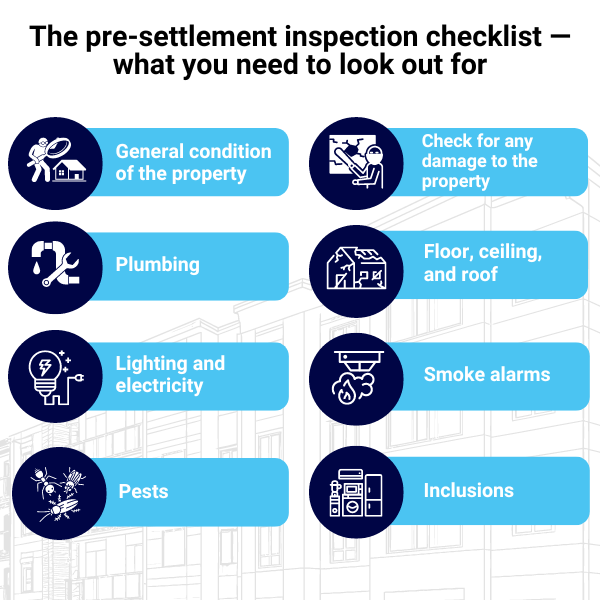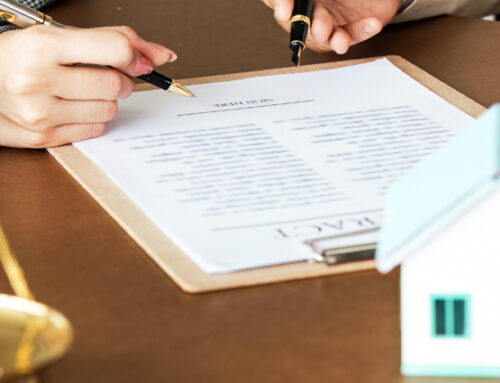For property buyers, the days and weeks leading up to the settlement date are filled with excitement and anticipation. In preparation for settlement, conveyancers will brief buyers on the need for a final property inspection to check on the condition of the property before the keys and payment are handed over.
Like with any big-ticket purchase, it’s important for property buyers to ensure that they are getting exactly what they are paying for — which means that they will have to be aware of what to look out for during the pre-settlement final inspection.
What happens during the final inspection?
The final inspection is your last opportunity to ensure that everything in the property, as outlined in the contract and that the property remains in the same condition as when the contracts were signed.
If the settlement depends on specific conditions, such as the seller having to repair or replace items, the final inspection is when you can confirm that these obligations have been fulfilled in line with the contract terms.
Any concerns that you have as a buyer about the property should be raised and addressed before settlement — after settlement is completed, you will be responsible for any costs of repair work to the property as its new owner.
When should the final inspection be arranged?
A final inspection of the property should be arranged at least a week out from settlement date. This provides both buying and selling parties a buffer period for negotiations should there be any issues or concerns during the final inspection.
It is not advisable to arrange the final inspection earlier than a week before settlement. It is not recommended to conduct the final inspection on the day of settlement (or even the day before) as it may not leave enough time to negotiate if any issues are raised.
If the property is to be made vacant on settlement, the final inspection should also take place after the vendor/tenant has moved out of the property completely.
The pre-settlement inspection checklist — what you need to look out for
In preparation for the final inspection, familiarise yourself with the specific conditions of sale for the property — it’s generally recommended to bring along the contract of sale to the final inspection so that you can refer back to it if needed.
Here is a comprehensive checklist of the key things to look out for during the pre-settlement or final inspection:
- General condition of the property — it should be in a neat and tidy state, with no obvious piles of rubbish, debris, or items left behind by a previous tenant.
- Check for any damage to the property that may have occurred since the last inspection — new signs of damage to the property that are not listed on the contract should be noted and raised to the vendor. It is also advisable to take photo or video documentation for evidence.
- Plumbing — ensure that all taps and water fixtures are in the same condition as at the day of sale, with no new leaks or drainage issues within the house.
- Lighting & electricity — test all light switches and power points to ensure that they are in the same condition as the day of sale.
- Smoke alarms — check that the smoke alarms are in working order. Please always refer back to the contract to check if this is covered.
- Pests — if there was a previously highlighted issue of pests for the property, and negotiations where made for the vendor to fix it, confirm with the vendor that they have been taken care of by a professional removal service.
- Inclusions — compare the list of inclusions and appliances in the contract of sale with what is present in the property to ensure that they are accounted for.
What to do if you find defects or have concerns after the pre settlement final inspection
Any concerns you have with the property such as missing inclusions, new damage or uncompleted repairs should be raised immediately with your conveyancer. If you have any documentation of the issues (photos or videos showing a comparison), provide these to your conveyancer as well so that they can be used to support the claims.
Your conveyancer will get in touch with the vendor on your behalf so that they can take the necessary actions to address them accordingly. In most cases, the issues will be fixed by the vendor before the settlement date.
However, in instances where the vendor is unable to complete repairs before settlement, your conveyancer can negotiate a price reduction that covers the repair costs that will need to be arranged by you as the new owner.
At Entry Conveyancing, we guide each of our clients on what to cover during the final inspection process to ensure that all of their interests are looked after. Our team of expert conveyancers in Sydney, Brisbane, and Melbourne are dedicated to ensuring that you get the best value for your property purchase across Australia.






